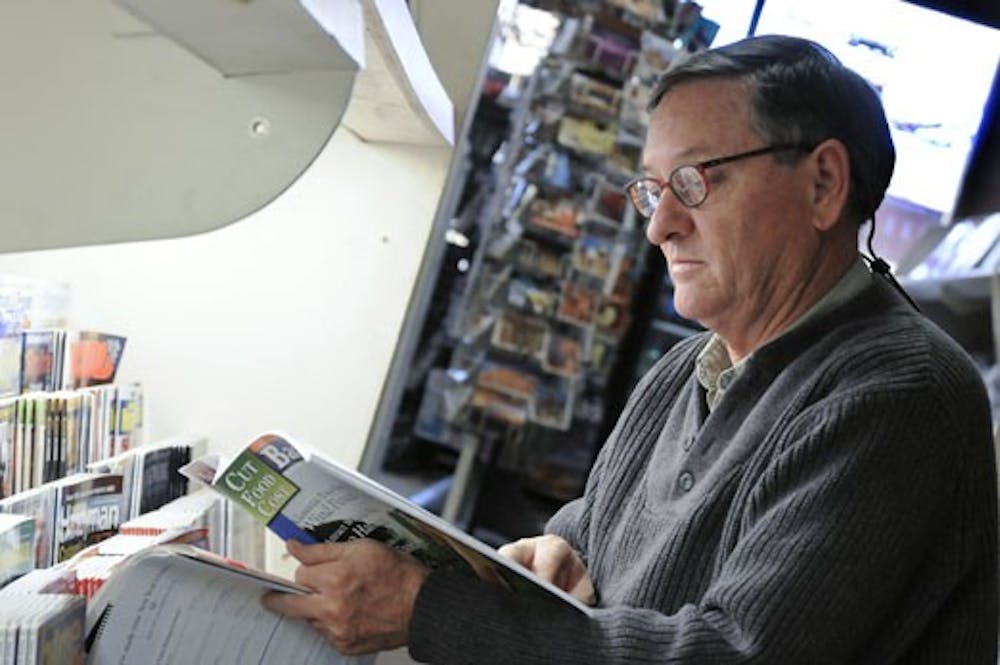Wednesday was an unusual day for Newsland Bookstore. It was busy.
In the early hours, people swept in and out of the newsstand at 2112 Central Ave. Some bought six or seven copies of the New York Times. Others grabbed a Wall Street Journal and a USA Today. A few topped off the stack with an Albuquerque Journal.
Roger Walsh, who owns the store, said he expected the crowds. After all, the day before was the historic inauguration of Barack Obama, and people wanted a piece of history.
"Elections, I do real well," he said. "Being the first African-American president, it's kind of a landmark for America."
But the following days, everything was back to normal. Sales slowed down, something Walsh has grown used to.
"Printed material is changing," he said. "And in my eyes, I don't see within two decades that we should have a newsstand, much less a newspaper."
Get content from The Daily Lobo delivered to your inbox
It wasn't always like this. There was once a time when Walsh's shop was a beacon of information, a place where people flocked to get their news fix.
Walsh got his start with Newsland in 1982, just a few years after the energy crisis, when he was looking for a way out of the oil business. An opportunity came up: His brother owned a newsstand on Central Avenue, but he was having financial troubles. Walsh bought the store and relocated his family from the Montana oil fields to urban Albuquerque.
Back then, print was in its prime. Back then, Newsland sold 44 out-of-state newspapers. They came from cities as big as Chicago, Los Angeles and San Diego. Some came from cities as small as Hartford, Conn.
"Pretty much anybody who relocated to Albuquerque from another town, that's how they (got their news)," he said. "And now they just have to push a button."
Around 1998, Walsh realized his customers were leaving him for the Internet. They could now rely on a computer to bring them the front page, and they didn't even have to get out of bed.
It happened almost overnight, Walsh said. People stopped coming in. No longer were they shelling out $6 for a copy of their hometown newspaper. Instead, they were getting their news online - most of the time for free.
By 2004, he was losing too much money to keep the newspapers. The store now sells just one out-of-state newspaper.
"It makes sense, you know, especially for ecology in the long run. I mean, if you look at my store right now," he said, glancing at the rows and rows of magazines, "I have about four Douglas-fir trees right here."
But magazine sales have been affected, too. Since 1998, store profits have gone down by 20 percent. And they continue to decline by 2 to 3 percent every year.
He does, however, have a base of loyal customers. Walsh said he's on a first-name basis with 99 percent of his customers, including Charles Lowery, who swung through the doors Wednesday to buy a copy of the New York Times.
Lowery said he considers himself part of the "old school." He doesn't trust the Internet as a source for news.
"I can get anything I want off the Internet," he said. "But I think newsprint has some interesting stories. It has a certain touch and feel to it that connects me with whatever it is in that publication."
Lowery and Walsh reminisced about magazines and newspapers. They like the smell of them; they like the touch. They like that they can read them on the porch, or in the bathroom.
"Besides," Lowery said, "how awkward is that, having a laptop on the toilet? What the heck is that all about? Not only that, I can't crumble up the laptop after I'm finished and use it to start my fire at home. You can do that with newspaper."
But not everyone is from the old school - like Jacob Martin, a 20-year-old computer programmer who works at Newsland.
Martin, 20, calls himself a front-page scanner. When he comes into work, he'll pick up a copy of the New York Times - sometimes in search of typos - or a Wall Street Journal to see if there's anything interesting.
If there's nothing, he'll leave it at that. Hardly ever will he buy a newspaper.
"Most of what I buy is drinks and tobacco," he said.
"I have to say I really don't keep up with (news) even if there's something big going on. I pretty much just listen to people talk around here. That's pretty much all I need."
He does like the art magazines Newsland carries. Sometimes he'll buy one so he can cut out images and paste them on his walls.
But when it comes to news, he has no interest in current events or politics. Instead, he scours the Internet for tech blogs.
"I just find newspapers really depressing," he said. "Even people who are regulars and buy them every day will say something like, 'Oh, I'm ready for my daily sob fest,' or whatever. Everyone seems to think they're kind of depressing. They kind of feed on tragedy."
Within two decades, Walsh predicts, newsstands and newspapers will disappear. That means the death of his business, the dimming of that beacon of information.
But until that day, he will continue to provide print news to his customers.
"I'm very comfortable at this time. So until it becomes a burden to come to work because I'm not making any income, I'll continue it," he said. "It's what I do. It's what I know. Most of my friendships, most of my companions, all kind of revolved around it."






